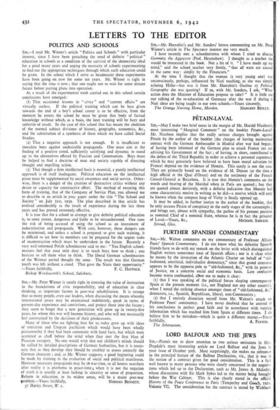POLITICS AND SCHOOLS
LETTERS TO THE EDITOR
Stit,—I read Mr. Wiener's article "Politics and Schools" with particular interest, since I have been preaching the need of definite " political " education in schools as a condition of the survival of the democratic ideal for a good many years and urging the necessity of schools experimenting to find out the appropriate techniques through which such education could be given. In the school which I serve as headmaster these experiments have been going on now for some ten years. Mr. Wiener is right in saying that the time is now ; that one ought not to wait for some distant future before putting plans into operation.
As a result of the experimental work carried out in this school certain conclusions have emerged: (I) That occasional lessons in " civics " and "current affairs" are virtually useless. If the political training which can be best given towards the end of a boy's school career is to be effective, from the moment he enters the school he must be given that body of factual knowledge without which, as a basis, the later training will be hazy and unfertile of result. In the case of this school that has meant the abolition of the normal subject divisions of history, geography, economics, &c., and the substitution of a synthesis of these which we have called Social Studies.
(2) That a negative approach is not enough. It is insufficient to inoculate boys against undesirable propaganda. One must aim at the finding of a positive creed, sufficiently satisfying and dynamic to stand up to the alternatives offered by Fascism and Communism. Boys must be helped to find a doctrine of man and society capable of directing thought and impelling action.
(3) That though a firm intellectual basis is essential, a purely intellectual approach is of itself inadequate. Political education on the intellectual plane must be supplemented by social awareness and social service. Other- wise, there is a danger of the creation of destructive critics without any desire or capacity for constructive effort. The method of ensuring this form of training, that of the Company of Service Plan, you allowed me to describe in an article in your paper under the title "The School and Society" on July 3Ist, 5939. The plan described in that article has evolved considerably as the result of experience during the last three years and has proved extremely effective.
It is true that for a school to attempt to give definite political education is, to some extent, dangerous and liable to be misunderstood. One runs the risk of being accused of using the school as an instrument of indoctrination and propaganda. With care, however, these dangers can be minimised, and unless a school is prepared to give such training, it is difficult to see how its members can be prepared for the urgent tasks of reconstruction which must be undertaken in the future. Recently a very well-informed Polish schoolmaster said to me: "You English school- masters feel that your only duty is to teach boys how to think ; you hesitate to tell them what to think. The liberal German schoolmasters of the Weimar period thought the same. The result was that German youth was left without a creed. That gave the Nazis their opportunity."
—Yours faithfully, F. C. HAPPOLD. Bishop Wordsworth's School, Salisbury.


























 Previous page
Previous page